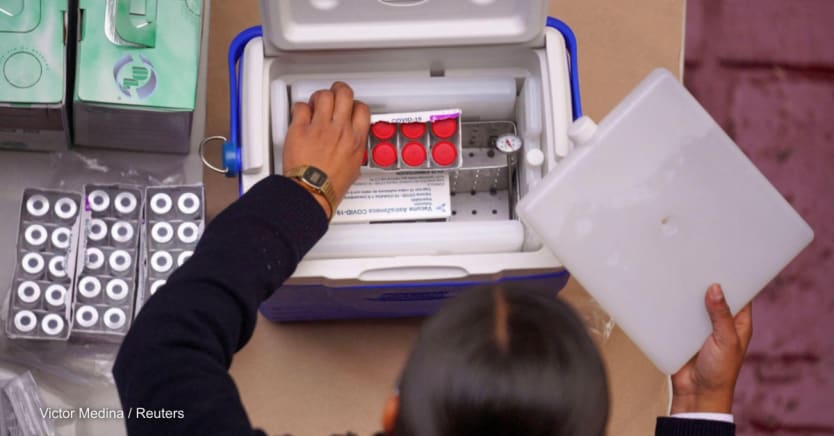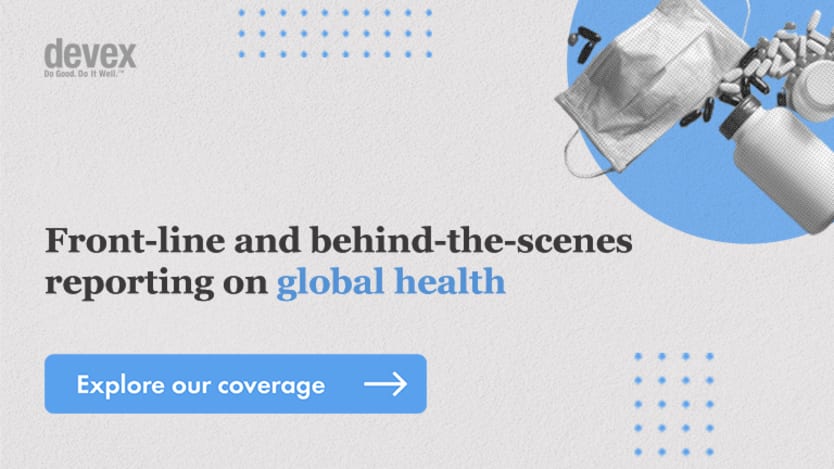Exclusive: Hungary thwarts consensus on vax donation rules

Hungary has emerged as the country that prevented Western aid donors reaching consensus on how to count donations of excess COVID-19 vaccine doses as official development assistance.
The Organisation for Economic Co-operation and Development’s Development Assistance Committee issued guidance on the issue this month, explaining that although negotiations on common rules had failed, the committee’s 30 members could still use the price of $6.72 per dose when counting their 2021 aid figures. That price is taken from the DAC’s proposal and is a weighted average of the donated doses delivered to low-income countries under Gavi, the Vaccine Alliance’s COVAX Advance Market Commitment.
NGOs vehemently opposed the idea of counting donations of doses initially bought for domestic use as ODA, arguing this would reward hoarding and inflate aid figures, potentially leading to less spending in other areas.
In a statement this week, DAC chair Susanna Moorehead wrote that donations of excess vaccine doses are eligible to be counted as aid in kind. And Moorehead argued the guidance includes safeguards: Members can report their vaccines at cost if the actual price is lower than $6.72, doses must have a shelf-life of 10 weeks on arrival in order to be eligible, and such aid will be clearly delineated in the preliminary 2021 figures, which will be announced in April.
But Oxfam Health Policy Manager Anna Marriott called the guidance “a double insult to the world’s poorest countries.”
“Firstly, rich countries bought up many more doses than they could use at a time of limited supply, preventing millions of people in developing countries from getting life-saving vaccines,” Marriott said in a statement. “Now they are free to charge any donations of unwanted doses to their aid budgets, to the detriment of other essential aid spending.”
A group of 30 civil society organizations from around the world recently published an open letter estimating that counting excess vaccines as ODA could effectively cost aid budgets of the United Kingdom, Canada, the European Union, and its member states a combined $1.7 billion. In the U.K. alone, 100 million vaccines pledged by June — at a cost of $4.40 per dose, according to a blog by researchers from the Center for Global Development — could now be counted at $6.72, which could mean $232 million out of the country’s aid budget.
“It's immoral to cut aid because we're giving away vaccines we bought for ourselves already; it's illogical to plan public finances to spend 0.5% of GNI [gross national income] on ODA and then to cut it back on the sly like this; and it's unpopular with MPs across the spectrum,” said co-author Ranil Dissanayake, policy fellow at CGD, citing a poll of parliamentarians carried out by the think tank. “Our global partners deserve better than these tricks to minimize our help to them.”
A spokesperson from Britain’s Foreign, Commonwealth and Development Office wrote to Devex that the final approach to valuing COVID-19 vaccines has not yet been finalized. The amount officials decide upon is not expected to be known until FCDO’s accounts are published.
“Rich countries bought up many more doses than they could use at a time of limited supply, preventing millions of people in developing countries from getting life-saving vaccines.”
— Anna Marriott, health policy manager, OxfamNerea Craviotto, senior policy and advocacy officer at Eurodad, argued that although the DAC chair’s statement addressed some of civil society’s concerns, “it still ignores the fact that these vaccines were never purchased for development aid purposes and should not be reported as such. This would undermine the principles of aid. It is as simple as that.”
“The most problematic part of this situation,” she said, “is that regardless of whether there is an agreement or not, donors who want to report the donation of their excess vaccine doses will be able to do so.”
The topic proved divisive among donors too, with the United States and the Netherlands both voicing reservations and adding conditions, such as that the rules only apply to 2021 ODA.
Yet as the deadline for objections to the latest proposal ticked past on Jan. 31 without an announcement from the DAC in Paris, confusion reigned over who had objected to the common rules and why.
The answer lay in Budapest.
The Hungarian OECD delegation told Devex this week that though COVID-19 vaccine donations fall well within the definition of ODA, “the application of a fixed price model contradicts the existing OECD DAC reporting guidelines, which states that procurement prices should be utilized when market prices cannot be assessed.”
“Since the market prices of vaccines change constantly (depending on supply availability, demand, manufacturers, purchasing power, etc.), the application of a fixed price would lead to statistical distortions,” the delegation wrote. “In line with the standard definition of ODA, the value transferred via a donation should be assessed on the basis of the amount of resources one country transfers to another, which therefore precludes the use of a fixed price. For these reasons, Hungary was not in the position to support the suggested price.”
Oxfam’s Marriott told Devex Thursday however: “Hungary's position on counting unwanted doses as aid at the excessive monopoly prices paid by rich countries is shameful. In the absence of an agreement, donor governments should abandon attempts to reward themselves for the damage they have caused, and instead scrap any plans to count excess vaccine donations as aid.”

Search for articles
Most Read
- 1
- 2
- 3
- 4
- 5

